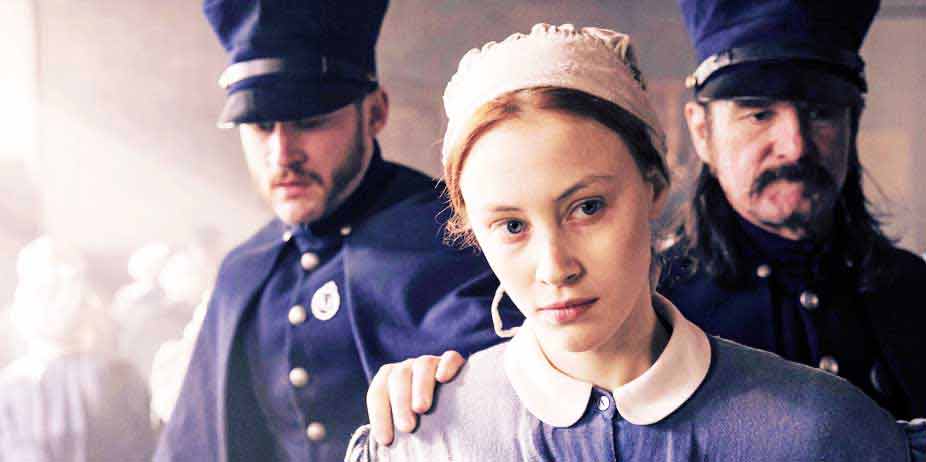
Alias Grace (2017)
Margaret Atwood has become a household name in the last year, thanks to the small-screen adaptation of her controversial novel, The Handmaid's Tale. Now, Netflix tackles another of her books, based on a gruesome Canadian murder and the complex woman involved in the horrendous scene. It proves an ambiguous, slow-paced but absorbing murder mystery that allows the audience to draw their own conclusions.
Years after she is sent to an asylum for insanity, Grace Marks (Sarah Gadon) attracts the attention of a psychologist, Dr. Jordan (Edward Holcroft) who hopes to prove her guilt or innocence, and solve a mystery that has plagued the minds of those around her for over two decades. As he sits each afternoon in a sunny parlor with Grace, she stitches a quilt for the family that allows her to work for them and recounts her story, from beginning to end. Or, is she telling him only what he wants to hear?
Young Grace experiences her first hardship on the ship from Ireland, after her mother dies midway through the voyage, leaving her to bear the brunt of her father's bad temper and sinful passions. He casts her off and she finds employment in an upscale home, where she befriends the bright, spirited Mary Whitney (Rebecca Liddiard). The two become inseparable until the unthinkable happens; left without Mary to guide her, and tormented by recent events, Grace agrees to move into a new, higher paid position elsewhere, under the housekeeper Nancy Montgomery (Anna Paquin). Little does anyone know that before the year is out, two people in the house will be dead. And Grace's own life or death depends on the conclusions Dr. Jordan draws from her tale.
I'm not sure what to say about this film; if you want a story that provides all the answers, it won't satisfy you, because it is full of ambiguities -- so much so that once I wrapped my mind around certain elements of it, I knew another viewing would be in order, paying closer attention to unravel the threads and form a solid conclusion in my mind as to the 'true events.' It's an exquisite piece of cinema, in the sense that it's beguiling, it doesn't shy away from the horrors of domestic servitude from the period (without being lured about them), it has a primarily female presence behind it (which shows in the respect the actresses receive), and it literally raised the hair on the back of my neck with one scene toward the end. The acting is positively radiant -- Gadon gives such a masterful performance, it's hard to decide whether Grace is an innocent, utterly insane, has multiple personalities, or an evil, scheming, manipulative, sadistic genius.
There's a pervasive sense of menace throughout, of dread and gradual horror that builds to a curious ending, sinister in its undertones; it left me a tad unsettled, because I cannot be sure what the ultimate off-screen conclusion will be. Who is telling the truth, Grace in her interviews, Grace in her testimony, or those who spoke about Grace? At the risk of a mild spoiler, it takes courage not to tell us.
Sexual Content:
A father touches his daughter intimately and tries to
kiss her; an unmarried woman falls pregnant; a woman is
shocked to learn another woman is a mistress of the man
who owns the house; conversation about masters 'wanting
more from the help' than they are owed (and 'expecting
you to serve on your back'); a woman says men at the
asylum have taken liberties with her (raped her); we see
flashbacks of a doctor in the asylum putting his hand
under her skirt; a man has romantic /
sensual dreams about a woman; a woman kisses a man,
climbs on top of him in bed, and they start to have sex
(until he realizes who she is; it's a fairly long
scene); an emotionless sex scene (clothed, movement,
noise) in which the man tells the woman she isn't the
one he wanted; we see a flashback of a man on top of a
woman, trying to force her / but she kicks him and he
scrambles away; a man asks a woman to 'give me what you
promised me' and she shuts the door in his face.
Language:
Occasional mild profanities (damn, hell, bloody, etc)
and uses of "God."
Violence:
A man slaps his daughter so hard, she hits her head on
the wall and blacks out; a woman slaps another woman;
multiple flashbacks to a woman with a bloody face
falling down the stairs with a crunch and being
strangled on-screen; we see a man hold up a severed limb
in the shadows and hear him 'hacking her to pieces'
(briefly); a man is shot in the chest; a woman struggles
with a man; a woman has an abortion and is found dead
the next day, her sheets / garments drenched in blood.
Other:
SPOILER. A woman intimates she is 'possessed' by a dead
woman's spirit, after she falls into a hypnotic trance
(she starts acting creepy / speaking in a low voice /
being aware of her surroundings and inferring things
about people); a woman is obsessed with the idea of
spirits being unable to leave rooms in which people
died.
